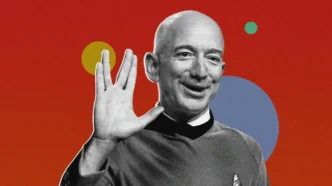A stealthy electric vehicle startup called Slate Auto, quietly backed by Jeff Bezos, is making waves from its base in Michigan. Multiple documents and insider sources reveal that the billionaire’s family office is directly tied to the EV company, which aims to begin production as early as 2026.
Launched in 2022, Slate Auto emerged from Re:Build Manufacturing, a manufacturing incubator connected to Bezos. Despite operating under the radar, the company has hired hundreds of employees from industry giants like Ford, General Motors, Stellantis, and Harley-Davidson.
Several high-profile investors have also joined the ride. Mark Walter, owner of the LA Dodgers and CEO of Guggenheim Partners, and Thomas Tull, a major backer of Re:Build Manufacturing, are now involved in Slate Auto’s expansion. Both were listed as board members in recent state filings, suggesting participation in the company’s Series B round.
A Bold $25K Electric Pickup Vision
Slate Auto is aiming to disrupt the EV market with an affordable two-seater electric pickup priced around $25,000. Insiders say the company is modeling its ambition after iconic vehicles like the Ford Model T and the Volkswagen Beetle — cars that redefined accessibility.
To fund this vision, Slate raised at least $111 million in a Series A round last year. While Bezos’ family office was involved, exact investment figures remain undisclosed. The company has since wrapped up a Series B round, authorizing nearly 500 million preferred shares priced at $2.37 each. More than 400 million shares of common stock were also authorized.
Although SEC filings for the Series B haven’t surfaced yet, Slate has told employees the round closed in late 2024. Job postings and other documents hint that the company is eyeing a production facility near Indianapolis, Indiana. It remains unclear whether this will involve acquiring an existing factory or building a new one.
Strategic Timing in a Shaky EV Market
Slate Auto is entering the market during a challenging period for electric vehicle companies. Growth in the sector has slowed, and several EV startups have filed for bankruptcy. Even major players like Rivian and Lucid have struggled to stay afloat while burning through billions.
Still, Slate believes its low-cost model can work — thanks to a unique strategy. In addition to the pickup, the company plans to launch a high-margin line of accessories and apparel. Job listings reveal ambitions to let customers personalize their vehicles through parts, upgrades, and lifestyle products.
This dual-revenue approach mirrors strategies used by legacy brands. Harley-Davidson leveraged apparel sales, and Stellantis capitalized on Mopar parts and accessories. Unsurprisingly, Slate’s executive team is filled with veterans from both companies.
Deep Amazon Roots and Executive Powerhouse
Slate Auto is infused with former Amazon leadership. The company’s early backers include Diego Piacentini, a former Amazon executive. It also emerged from Re:Build Manufacturing, a venture co-founded by Jeff Wilke — previously the CEO of Amazon Consumer. Several other Amazon alumni, including Wei Gao, are also involved in Re:Build.
The EV startup’s digital, e-commerce, and automotive strategy leads all share deep Amazon DNA. Even its name — Slate — follows a naming convention reminiscent of Amazon’s branding, such as events like re:MARS and re:Invent.
Although Slate is one of Bezos’ most direct personal investments in EVs outside of Amazon’s relationship with Rivian, he reportedly plays a passive role. Sources say he has not visited Slate’s offices in Michigan or Long Beach, California, where the startup operates a leased design studio.
A Different Kind of EV Playbook
Unlike most EV startups, Slate Auto isn’t trying to replicate Tesla’s luxury-first approach. Instead, the company is flipping the model — launching with a budget-friendly vehicle meant to be someone’s first car. The business model is designed for long-term personalization and modular upgrades.
In late March, the company filed for a trademark on the phrase: “WE BUILT IT. YOU MAKE IT.” This hints at a strategy that encourages buyers to gradually enhance their vehicles using Slate’s own line of parts and accessories — from speakers and USB ports to pet harnesses.
Internal job listings reveal more about the company’s vision. One position described “Slate University,” a future educational platform to teach customers how to repair and personalize their vehicles. Another listing for a lead product manager mentioned plans to develop lifestyle merchandise and utility parts, highlighting the startup’s emphasis on customer expression.
Built by Veterans, Powered by Passion
Slate’s leadership roster is stacked with automotive industry veterans. Executive chairman Rodney Copes spent two decades at Harley-Davidson. CFO Ryan Green also held senior financial roles at Harley-Davidson and later at Rivian. Other top hires include ex-Harley and Stellantis leaders across service, growth, product management, and accessories.
Rather than building every component in-house, Slate plans to source major components like high-voltage battery packs and electric motors from third-party suppliers. The company describes its design process as “challenging the status quo,” aiming for innovative engineering across even the smallest vehicle details.
A recent job post for a PR lead emphasized a passion for automobiles: “Must love cars! You’ll be thinking about cars all day every day.”
A Non-Traditional Leadership Structure
Interestingly, Slate Auto has no high-profile founder serving as CEO — another way it breaks from typical startup norms. While Miles Arnone, CEO of Re:Build Manufacturing, is widely regarded as the startup’s founder, he doesn’t run Slate day to day.
That role belongs to Christine Barman, a seasoned automotive executive who spent more than 20 years at Chrysler. Barman oversaw vehicle programs for models like the Chrysler 300, Dodge Charger, and Jeep Cherokee. She later became VP of electrical and electronics for Fiat Chrysler, where she worked on Android Automotive integration and the company’s partnership with Waymo.
Barman entered Slate in 2022 after years of teaching and consulting in tech and engineering. Unlike many of her peers in the EV space, she maintains a low profile, focusing on execution rather than promotion.











